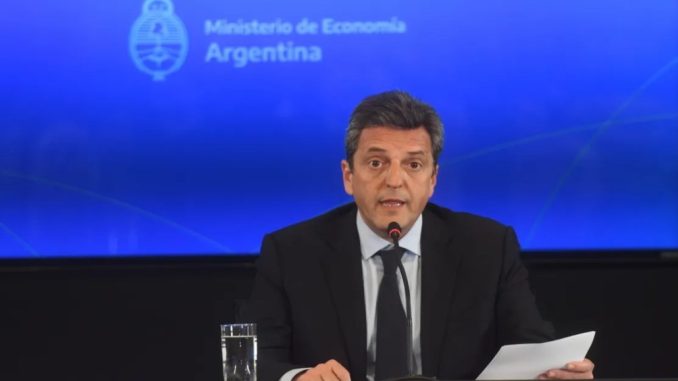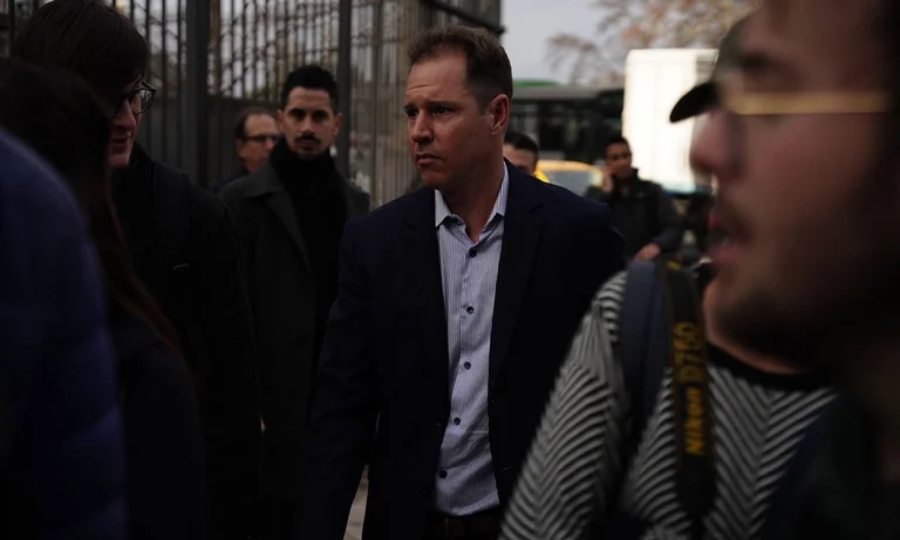
By Nicolás Zuttión
The inauguration and the act in which Sergio Tomás Massa took office as new Minister or “Super-Minister” of Economy, turned out to be a sort of transfer of command or change of government within the Frente de Todos. There is not much left to say about the measures. As shown in this article, the new economic plan is even more orthodox in order to comply with the goals agreed with the IMF. Once again, the chant that it is necessary to advance with more tariffs (mainly in energy matters), to carry out a new devaluation that will liquefy salaries (the creation of different types of exchange rates will aim that way), to increase trade surplus (algo related to creating special regimes for exporters) and to reduce the fiscal deficit. In addition, the persecution of social organizations continues after confirming a “review” of social programs. These recipes are not the only revival that torments the workers, but, in fact, it can be confirmed that some businessmen are strengthening their control over the destinies of the country. A “pragmatism” with an end in mind.
In first person
The tigrense, as it is publicly known, built his political career as a referent of the Frente Renovador with the support of certain leaders of the red circle. These days, such characteristics did not go unnoticed. Massa’s swearing-in ceremony was attended by those who, as Diego Genoud states in Massa: the unauthorized biography, transformed the new “super minister” into the true candidate of the establishment. Jorge Pablo Brito, vice-president of Banco Macro, president of the Association of Argentine Banks (ADEBA) and also president of River. A person that, following the succession line of his family, would be a kind of “brother” of Massa. It is public knowledge, also reflected in the bibliographic material of the above-mentioned journalist, that Jorge Horacio Brito was a sort of father in the individual launching of the career of Massa. Besides, it is speculated that he was one of the great financiers of his electoral campaigns.

In order not to go over all the names, we will emphasize other three: Marcelo Mindlin, Daniel Vila and José Luis Manzano. The first one is president of Pampa Energía and Grupo Emes. Pampa Energía is one of the most important companies engaged in the production and transportation of gas. The other two names, besides being referenced as a kind of Argentine multimedia czars, are also the ones that hold the company Edenor S.A., a private company dedicated to the distribution and commercialization of electric energy.
These names are of major importance, since in the first lines that Massa outlined as the savior of the government, this business sector was once again benefited. As the splitting of the tax rate turned out to be insufficient for the IMF, an even greater rate hike was introduced. Now every family that qualifies for the subsidy, if it exceeds the consumption of 400 kilowatts, will have to pay the excess as a full rate.
Vila and Manzano are smiling. Not only will Edenor’s revenues increase, but Massa will also become an iron guard for the subsidies which, by chance, never affect these privatized companies.
Agriculture also celebrates
The benefits granted by the super-minister go further than businessmen of the energy sectors. It seems that the government is going to show its staunchest defense of the agricultural employers’ sectors. To be clear, we will surely have to wait for Massa’s meeting with the Mesa de Enlace, which will take place next week. But, without wasting time, the new Secretary of Agriculture came out to support the behavior of the speculator soybean farmers. Juan José Bahillo stated in an interview with El Destape: “(…) they (the agricultural employers) are stating that it is necessary to generate predictability and macro stability, because market movements of the last weeks generate speculative logic. And it is logical that the producer, above all, withholds some of the grain, because in an unstable market, with expectations of measures that may improve the value of the dollar with which they liquidate, and in an inflationary context, it is understandable that they withhold”.
Nothing else can be expected from a person whose résumé, as indicated by Nadia Burgos, leader of the MST in the FIT-Unidad de Entre Ríos, includes a stint in the Rural Society due to their own commercial practice. Now it remains to be seen what will be the new “incentives”, or rather, the benefits that a sector that is tired of committing illicit acts will receive. The “rural dollar” did not seem to be enough and new incentives will come for those who, as Massa said, may have made a mistake in under-invoicing their grain exports.
Neoliberal and shameful “pragmatism”.
The organization chart of Massa’s ministry revives some characters that have become known for their political trajectory of applied austerity. The podium may be formed by Daniel Marx, who will be in charge of the control of the public debt. We should not forget that he was one of the authors of the “megacanje”. And, accompanying Marx, there is Raúl Rigo, who has long been an engineer of austerity budgets in the Peronist governments, and Vasco José De Mendiguren, who will be in charge of the Secretariat of Production. Will he act once again, as he did during Duhalde’s government, as a bishop for a new blow to wages? The finishing touch to this combo of names was thought to be Gabriel Rubinstein, who could become Massa’s deputy minister. However, his record on Twitter with countless criticisms to Alberto Fernández and CFK, put his appointment in the freezer of the FdT.
The arrival of these officials and the clear conservative turn, as indicated by the market men just mentioned, is being varnished with the idea of a supposed “pragmatism”. This is how Eduardo Aliverti puts it in his column entitled Que algo sigue en disputa, published in Página 12. In any case, by itself, the concept does not indicate anything. In politics, what is trafficked as an idea of this category is nothing more than the way of acting or making decisions according to which the only valid criterion is the one that is “functional” or the best for “certain circumstances”.
Everything up to this point is nothing more than pure phraseology without solid content. Karl Marx in his Feuerbach Theses, specifically number VIII, indicates: “Social life is, in essence, practical. All the mysteries that lead theory astray into mysticism find their rational solution in human practice and in the understanding of that practice”. Taking this epistemological definition of scientific materialism, we can conclude that this practice shows us that the pragmatism of the FdT is in accordance with the ends of capitalism itself. A political decision that perpetuates the whole neoliberal heritage. It can also be understood as a pragmatism that perpetuates the form of government as defined by Marx and Engels themselves in the Communist Manifesto: “(…) a committee that administers the common business of the entire bourgeois class”. The new direction of the government, Massa’s pragmatism, reconfirms a sentence that is 174 years old.
Due to this overturn, the electoral contract of the proposed FdT in 2019 was defaulted. But, in order to hide this situation, not only the leadership of this experiment wants to get rid of responsibilities. Its scribes, like the aforementioned Aliverti, raise arguments like the following to build a wall to protect a political and conservative front from its political swindle: “For those who speak today that the electoral contract was violated: where is that contract? Where was it written or promised that they would break with the IMF, or that radicalized measures would be taken? Enough poetry: the only explicit contract was to get rid of Macri”[i]. A blatant lie from any point of view. The electoral platform of the FdT, although it did not support the idea of breaking with the Fund, did not only contain the strategy of “getting rid of Macri”. Its content is published in this programmatic point. It is not that we want to vindicate it, at the time we pointed out and denounced its limitations for the real task that was proposed at the time: to put an end to the political inheritance of Macri’s government. Something very different from just changing a name.
The correlations of forces to bend the ongoing adjustment, which cannot be considered as a sacred prophecy at all, cannot be built with the businessmen who plunder this country on a daily basis. For this reason, all those stunned by so much hypocrisy and political conservatism, are the ones who must take the step of breaking with treacherous leaderships. As expressed in this letter by Cele Fierro and Alejandro Bodart, it is time to build our own tool, an independent political project of the workers and popular sectors themselves, so that the course is not the abyss. An abyss into which the bosses in power want to push us.
[i] Que algo siga en disputa. Página 12








